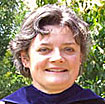Commentary on Psalm 27
Pastors regularly point to the psalms when people feel angry with God or despair of God’s goodness.
Psalm 27 captures the ambiguity that inevitably haunts our faith.
Look how the psalmist begins in verse 1: “The Lord is my light and my salvation; whom shall I fear? The Lord is the stronghold of my life; of whom shall I be afraid?” This is no general statement about the nature of God. It is a strong declaration of a very personal relationship. As Martin Luther insisted, theologizing about who or what God is will not sustain the heart in times of trouble. It is the confession that this God is “for me” — the stronghold of my life — that is crucial.
There is great boldness in the first three verses. Declarations of certain victory follow the initial exultant cry. Enemies will be overthrown; fear will be vanquished, “…though war rise up against me, yet I will be confident” (verse 3). Indeed, if God is for me, who shall be against me?
Then the psalmist’s tone shifts. Rather than confidently toughing it out in the midst of his foes, he seeks safety in the house of the Lord. Rescued from the dangers surrounding him, he is placed securely out of their reach (“under the cover of his tent,” “high on a rock” in verse 5) to dwell in the house of the Lord. He will behold the beauty of the Lord, joyfully offer sacrifices and fill God’s house with song. Here God is unambiguously “for me,” and the psalmist is wholly devoted to God. Nothing comes between them–no distractions of the world, no assaults of the enemy, no uncertainty of God’s intent.
At verse 9, the tone changes again. Having just talked of making melody to the Lord, the psalmist breaks forth with an anxious cry: “Do not hide your face from me.” His desperation ratchets up: “Do not turn your servant away in anger, you who have been my help.” Prayer to this God, the one we know as the Father of our Lord Jesus Christ, is a complex conversation. The psalmist now faces a different adversary, the erstwhile Helper who would now abandon him to his (mis)fortunes in the world.
Yet even as he pleads, he offers a challenge to his God. Remember who you are, you who have been my help, you who are my salvation. The psalmist concludes not with another plea, but with a pronouncement, perhaps even a challenge. “If my father and mother forsake me, the Lord will take me up” (verse 10). To take a child in your arms and raise him up is to claim that child as your own before the world. Whatever damage one’s adversaries inflict, they cannot destroy this act of divine adoption. God is not only my light and my salvation; God is the parent who remains faithful.
The psalmist again implores God’s protection from his enemies and then concludes with a strong confession (“I believe that I shall see the goodness of the Lord in the land of the living!” — verse 13) and with words of encouragement for his hearers (“Wait for the Lord; be strong, and let your heart take courage; wait for the Lord!” — verse 14). He shares with his community what he has learned from his own passage through the valley of the shadow of death.
The psalms were compiled from older collections of lyrics for use in the temple. They have been classified into a number of different categories (for example, laments, songs of trust, royal psalms), and one will find elements of more than one kind in a single psalm.
Psalm 27 includes a song of trust, prayers for deliverance, and a lament. The rapid fire movement among these responses to God makes clear the challenge of faith. The circumstances of our lives can appear to give the lie to God’s goodness. The empty echo meeting our prayers casts doubt upon God’s attentiveness. We feel forsaken, and we can so easily fall into unbelief.
So the psalm begins and ends with proclamations of trust. They serve to reassure us as to who God is for us and to remind God of who God is for God’s self. Luther wrote that if God came to his doorstep tomorrow and announced that on second thought he was not going to save him, he would respond, “Too late, I have your promise.” Not exactly a humble reply but an appropriate one in the circumstances, for this God has taken us up.
The psalmist is troubled by those who bear false witness against him and threaten him with violence. The foreclosure signs in our neighborhoods lay bare the violence wrought by corporate greed. We know the misery caused by unemployment and the suffering of debilitating illness.
In his description of Eden, Luther emphasized that it was a place where there was no fear — no fear of dying, no fear of other living beings, no fear of nature. It is a wonderful vision, for we live in a world fraught with fear. However, there is a bold word to throw in its face again and again — and in God’s. “I believe that I shall see the goodness of the Lord in the land of the living!” Then we wait.

February 28, 2010